IJCRR - 6(9), May, 2014
Pages: 65-72
Print Article
Download XML Download PDF
CONSUMER CONCERNS ABOUT THE USE OF ADDITIVES IN PROCESSED FOODS
Author: Ismail B.B., Yusuf H.L.
Category: Healthcare
Abstract:Objective: To determine the level of concerns of the respondents about the use of additives in processed foods and how it affects the way that they behave when purchasing processed foods containing additives. Method: A total of 50 respondents from the Medway area of Kent, United Kingdom, participated in the face to face interview which comprised 20 questions out of which six were used to determine the level of concern of the consumers about the use of additives in foods. Additional questions were asked on the respondents' demographic status and purchasing pattern of processed foods. Result: The result indicated that themajority of the respondents are concerned about the use of additives in processed foods from the viewpoint of health. Specific concerns by the majority of the respondents include the use of salt, sugar, preservatives and colouring agents in foods which is viewed as something negative, and this outweighed any perceptions about the positive functions that additives can perform, including improving the safety and extending the shelf life of foods. Conclusion: Most concerns regarding the use of additives in processed foods were related to long term health effects which include development of allergies, hyperactivity, asthma, hay fever and cancer.
Keywords: Consumer concerns, health effects, food additives, questionnaire survey
Full Text:
INTRODUCTION
In the 20th Century, food industries have gone through immense development through technological advancement accompanied by the increased use of additives in food processing (Diehl, 2002). Many people nowadays eat readyto-eat foods rather than preparing meals at home and for the maintenance of quality and shelf life of these foods, additives and preservatives are used, with salt and sugar being the most commonly used (Abdulmumeen et al.,2012). However, in recent times, despite the fact that additives have been used for many centuries, there have been increasing concerns amongst consumers about the use of additives, particularly artificial additives, in processed foods. Scientific studies have suggested that excessive intake of synthetic additives may result in adverse health conditions including hyperactivity, the development of an allergy and asthma (Wilson and Bahna, 2005; Randhawa and Bahna, 2009). Consumers are also doubtful about the effectiveness of various regulations on food additives established for the protection of their health (Tarnavölgyi, 2003; Shim et al., 2012). This has resulted in certain misconceptions and perceived adverse effects which may sometimes be false due to lack of scientific evidence. A survey conducted in 2007 by the Food Standards Agency (FSA) in the United Kingdom (UK) on Consumer Attitudes to Food Standards which aimed at determining the consumer attitudes, knowledge, and awareness with regards to food related issues indicated an increase in consumer safety concerns and more specifically regarding food additives/preservatives (Figure 1) with levels of concern about issues such as salt and sugar levels in foods higher than in earlier surveys. Salt was a major concern and mentioned by almost half of the UK respondents (50%), sugar (39%) and food additives (35%) (FSA, 2007).
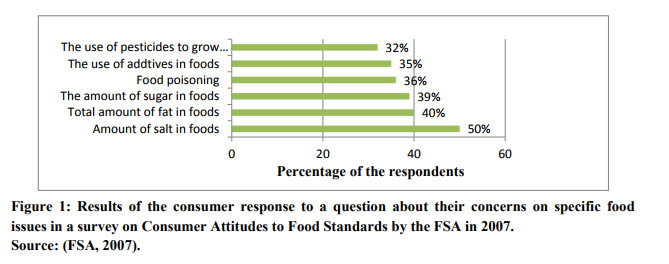
Regarding issues related to foods (Figure 2), Food additives/preservatives had the highest percentage of consumer concern (8%) followed by poor, unhealthy diet/children’s diet (4%) and 3% for both use of pesticides/chemicals, price, packaging and food labelling
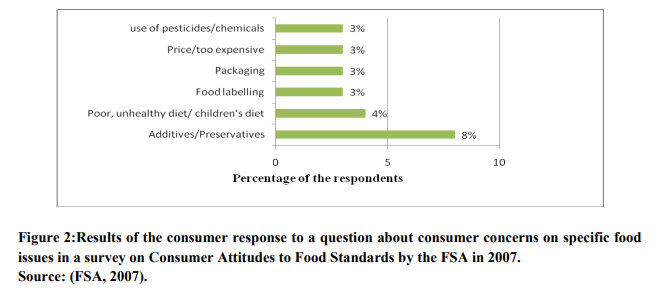
In 2012, the Biannual Public Attitudes Tracker survey conducted by the FSA (Figure 3) revealed similar results with the amount of salt in foods being the second highest food issue of concern (49%)) although food prices (63%) were the area of highest concern amongst respondents. The other main areas of concern related to food safety included the amount of sugar in food (42%) food additives in processed foods (28%) and food poisoning (32%).
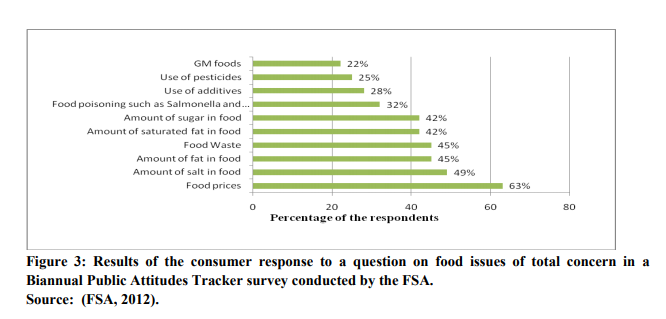
MATERIALS AND METHODS
The aim of this study was to investigate the level of concern about the use of additives in processed foods. Data were collected using a questionnaire survey conducted through face to face interviews. The questionnaire consisted of 20 questions out of which six questionswere used to determine the concerns of the consumers. The respondents’ demographic information was also collected for building a profile of the respondents and when using the data to see whether these characteristics have affected their responses to questions. A total of 50 respondents mostly adults over the age of 18 participated in the face to face interview carried out in public places such as cafes, parks, kiosks and other public gathering centres in the Medway area of Kent, United Kingdom. The type of questions and their justification is presented in Table 1.
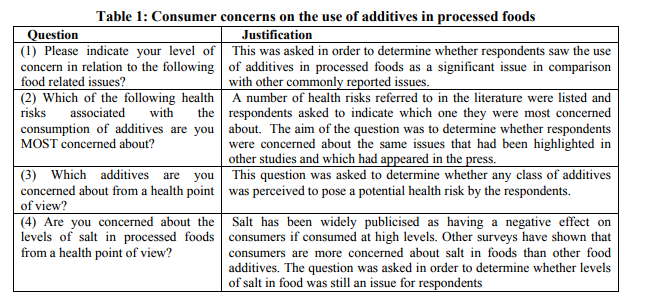

Analysis of data
The responses from the survey were calculated in percentage for each question and the results are presented in tables and figures and discussed.
RESULTS
Demographic data were collected for the respondents and their influence on responses was determined. Of the people who took part in the survey, 54% were male and 46% female. For the level of education, 24% have secondary level, 24% vocational training/college, 18% undergraduate and 24% postgraduate levels of education.
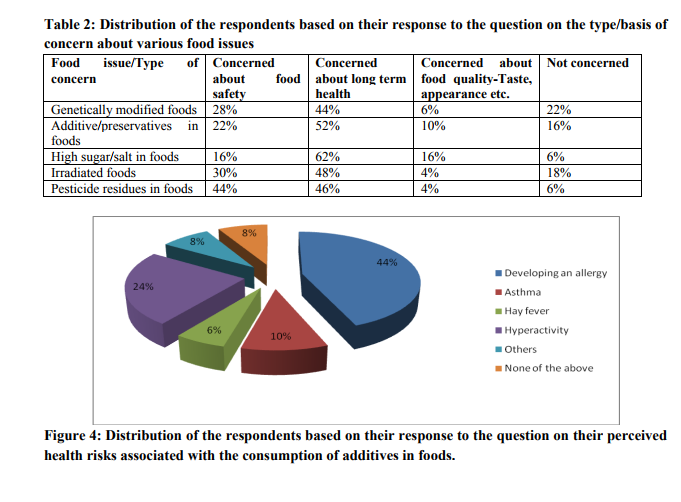
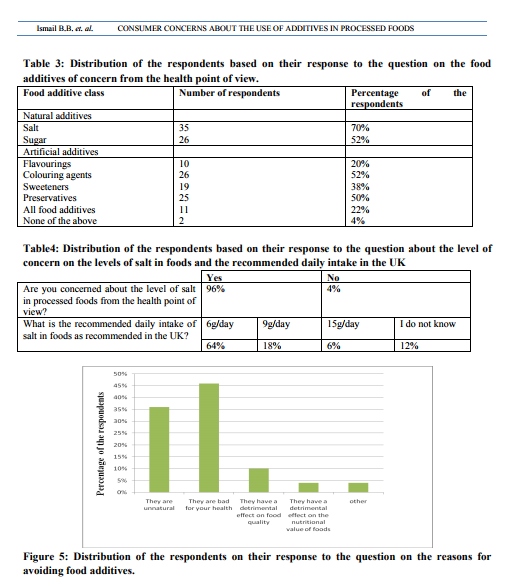
DISCUSSIONS
Safety concerns and perceptions about food additives
In order to determine the level of concern among the respondents about food additives in relation to other food issues, respondents were asked to select the type/basis of concern that they have about various issues on the basis of food safety, long term health effects, and food quality. The results presented in Table 2 show that the majority of the respondents (62%) were concerned about high levels of sugar/salt in foods followed by the use of additives/preservatives in foods (52%) on the basis of long term health effects. This indicates that most concerns about the use of additives in processed foods were based on their long term health effects. This agrees with the findings of the previous surveys conducted in 2007 and 2012 by the FSA on Consumer Attitudes to Food Standards which indicated that from the health point of view, salt was a major concern and mentioned by almost half of the UK respondents (50%), sugar (39%) and food additives (35%), With regards to food safety, pesticides residues in foods were cited as being a concern by the highest percentage of respondents (44%) and this may be attributed to the controversies and rising consumer concerns about pesticide residues in foods and its impact on the safety of foods (FSA 2007; FSA 2012). The food issue with the highest percentage of respondents saying that they were “not concerned” was GMOs and this may be attributed to the general unavailability of products containing GMOs on the UK market due to restrictions by various EU regulations which put in place stringent controls on the sale of GMOs in the EU.
Perceived health risks associated with the consumption of additives in processed foods
A list of health risks that have been linked to food additives in the press (Randhawa and Bahna 2009) was presented to the respondents and they were asked to select the one they were most concerned about. Figure 4 shows “developing an allergy” was selected by the largest proportion of the respondents (44%), followed by hyperactivity (24%). This was similar to the findings of a review by Randhawa and Bahna (2009) on hypersensitivity reactions to food additives and a survey by Wu et al. (2013) on identifying critical factors influencing the use of additives by food enterprises in China which indicated that consumer perceived health risks linked to the consumption of additives in food include hyperactivity, developing an allergy, asthma, hay fever as well as body reactions.“Other” health risks mentioned by 8% of the respondents included cancer and ill health. Dicks (2007) suggested that when consumers have real concerns, they fail to trust food regulators, producers and processors. Hence, this can serve as an obstacle that could influence their purchasing behaviour.
Additives used in processed foods that are of concern from the health point of view
A list of natural and artificial additives was presented to the respondents and they were asked to select those that they were concerned about from a health point of view. Respondents were allowed to choose more than one option. Table 3 shows that the majority of the respondents chose salt (70%) as the additive of concern from the health point of view. This was followed by sugar and colouring agents (52% each) and preservatives (50%). Salt is a major concern for the public despite its importance in foods due its link with hypertension, which leads to cardiovascular disease (He and MacGregor 2008). Consumers are also concerned about high sugar levels in food. Findings by Morengaet al. (2013) on dietary sugars and body weight suggested that despite the importance of sugar in foods, its prolonged consumption has been attributed to some adverse health conditions such as dental caries, cardiovascular disease, obesity, gout, some cancers, hyperactivity and fatty liver disease. From the list of artificial additives of the majority of the respondents, (52%) said that they were concerned about colouring agents. Many consumers have been concerned that colouring agents are used by processors as ways of hiding the inferior quality of foods and are disturbed by reports that some artificial colouring agents used in foods may be carcinogenic or cause allergic reactions (Dicks 2007).
Concern about the levels of salt in processed foods
Respondents were asked whether they were concerned about the levels of salt in processed foods and if they were aware of the recommended maximum daily intake in the UK. Interestingly, Table 4 shows that the vast majority of the respondents (96%) were concerned about the levels of salt in processed foods and 64% were aware that the recommended maximum daily intake is 6g. This can be attributed to public education reduction strategies and campaigns that have been implemented in the UK by the FSA. Surprisingly, despite concerns about high levels of salt in processed foods, most respondents (96% in Table 4) still reported that they consumed high salt foods such as snacks and pickled foods.
Main reasons for avoiding food additives
Respondents were asked about the main reasons that they had for avoiding food additives. Figure 5 shows that 46% said that they avoided additives because they are bad for their health and 36% said they are unnatural. This is linked to Question (1) about the basis of concern for the use of additives which indicated health risk as an important concern by the consumers regarding the use of additives in foods.
CONCLUSIONS
This questionnaire survey determined consumer concerns about the use of additives in processed foods and how it affects the way that they behave when purchasing processed foods containing additives. The basis of concern is also important for the Government and other stakeholders such as processors to understand, in order to maintain consumer confidence in their ability to protect their interests, and make sure that their safety had not been compromised. The result of the study indicated the rising concern about the use of additives in processed foods especially salt which is a major concern by the vast majority of the respondents (94%). The recommended daily intake of salt was correctly identified by a majority of respondents. Recent information campaigns produced by the FSA that informed consumers about the recommended maximum daily intake of salt may explain this. The results of the study indicated that most respondent’s concerns regarding the use of additives in processed foods were related to long term health effects. Additives have been linked with various health issues such as the development of allergies, hyperactivity, asthma, hay fever and cancer. A contradiction in the views of respondents was that despite their concern about potential health risks, everyone reported buying processed foods containing additives. Specific examples included crisps, chocolate bars and pickled vegetables; onions, gherkins and olives which contain significant levels of salt, sugar or other artificial additives. Provision of abalanced and science based information about food additives through consumer trusted sources describing the potential benefits and risks of food additives, and addressing the concerns of consumers, will likely reduce the level of concern about long term health effects.
ACKNOWLEDGEMENT
I wish to acknowledge the generous guidance and support of my MSc supervisor Dr. Richard Fuchs, Programme Leader for the MSc programme in Food safety and quality management, University of Greenwich, United Kingdom. Authors acknowledged the immense help received from the scholars whose articles are cited and included in references of this manuscript. The authors are also grateful to authors/editors/publishers of all those articles, journals and books from where the literature for this article has been reviewed and discussed.
References:
REFERENCES
1. AbdulmumeenHA, Risikat AN, Sururah AR Foods: its preservatives additives and applications. International Journal of Chemical and Biochemical Sciences2012; 1: 36-47.
2. Dicks EG. (2007) A model of consumers' perceptions of food additives and consequent Purchasing behaviour Available from: https://www.google.co.uk/search?q=A+model +of+consumers'+perceptions+of+food+additiv es+and+consequentpurchasing+behaviourand rls =com.microsoft:en-gband ie=UTF-8and oe=UTF- 8and startIndex=and startPage=1and gws_rd=crand ei= RQpwUubHGuLR0QW7zIDwCQ(accessed 24 October 2013).
3. Diehl JF. Some established facts and some new concepts in food toxicology. A review.ActaAlimentaria2002;31:355-369.
4. Food Standards Agency (2007) Consumer attitudes to food standards: Wave 8 UK Report Final. Available from: http://www.foodbase.org.uk//admintools/repor tdocuments/441-1-777_cas2007ukreport.pdf (accessed 6 July 2013).
5. Food Standards Agency (2012) Biannual Public Attitudes Tracker UK Report Final. Available from: http://www.food.gov.uk/multimedia/pdfs/bian nualpublicattitudestrack.pdf (accessed 24 September 2013).
6. He F, MacGregor GA. A comprehensive review on salt and health and current experience of world-wide salt reduction programmes. Journal of Human Hypertension 2008; 23:1-22.
7. Morenga LT, Mallard S, Mann J. Dietary sugars and body weight: systematic review and meta-analyses of randomised controlled trials and cohort studies. British Medical Journal 2013; 349:1-25.
8. Randhawa S, Bahna SL. Hypersensitivity reactions to food additives. Current Opinion in Allergy and Clinical Immunology 2009; 9: 278–283.
9. Shim S, Seo SH, Lee Y, Moon G, Kim M, Park J. Consumers’ knowledge and safety perceptions of food additives: Evaluation on the effectiveness of transmitting information on preservatives. Journal of Food Control 2012;22: 1054-1060.
10. Tarnavölgyi G. Analysis of consumers. Attitudes towards food additives using focus group survey. Agriculturae Conspectus Scientificus 2003; 68:193-196.
11. Wilson BG, Bahna S L. Adverse reactions to food additives. Annals of Allergy, Asthma and Immunology 2005; 95:499-507.
12. Wu L, Zhang Q, Shan L, Chen Z. Identifying critical factors influencing the use of additives by food enterprises in China. Journal of Food Control 2013; 31: 425-432.
|






 This work is licensed under a Creative Commons Attribution-NonCommercial 4.0 International License
This work is licensed under a Creative Commons Attribution-NonCommercial 4.0 International License